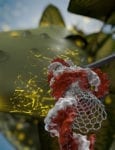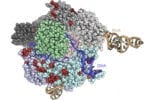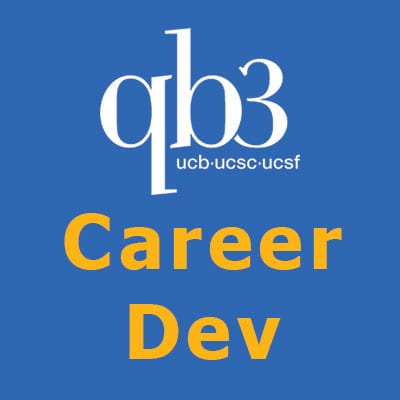Highlights of QB3-Berkeley research, awards, and events news from 2019
UC rings out 2019 with its 20th CRISPR patent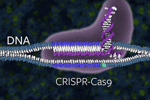 The federal government has given the University of California a New Year’s Eve gift—its 20th U.S. patent on CRISPR-Cas9 gene-editing technologies. The addition expands a broad patent portfolio that is already being used to improve human and animal health and crop breeding. The new patent is the 18th involving CRISPR-Cas9 technology received this year by the UC and its collaborators — the University of Vienna and Emmanuelle Charpentier, who co-invented the technology with QB3-Berkeley faculty affiliate Jennifer Doudna, professor of molecular and cell biology and chemistry. Read more about new patent on Berkeley News. >
The federal government has given the University of California a New Year’s Eve gift—its 20th U.S. patent on CRISPR-Cas9 gene-editing technologies. The addition expands a broad patent portfolio that is already being used to improve human and animal health and crop breeding. The new patent is the 18th involving CRISPR-Cas9 technology received this year by the UC and its collaborators — the University of Vienna and Emmanuelle Charpentier, who co-invented the technology with QB3-Berkeley faculty affiliate Jennifer Doudna, professor of molecular and cell biology and chemistry. Read more about new patent on Berkeley News. >
Genomic gymnastics help sorghum plant survive drought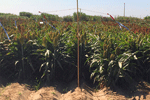 A new study published this week in the journal Proceedings of the National Academy of Sciences provides the first detailed look at how the plant exercises exquisite control over its genome—switching some genes on and some genes off at the first sign of water scarcity, and again when water returns—to survive when its surroundings turn harsh and arid. The team of researchers who published the study includes QB3-Berkeley faculty affiliate John Taylor. Read more on Berkeley News. >
A new study published this week in the journal Proceedings of the National Academy of Sciences provides the first detailed look at how the plant exercises exquisite control over its genome—switching some genes on and some genes off at the first sign of water scarcity, and again when water returns—to survive when its surroundings turn harsh and arid. The team of researchers who published the study includes QB3-Berkeley faculty affiliate John Taylor. Read more on Berkeley News. >
New center illuminates ‘microscopic universe within each cell’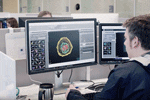 In a video posted online this week, Seeker, a San Francisco-based digital media network focused on science and technology, profiled UC Berkeley’s newest cutting-edge facility, the Advanced Bioimaging Center. Run by Srigokul “Gokul” Upadhyayula, a newly arrived assistant professor-in-residence of molecular and cell biology, the center is building imaging systems that will provide real-time video of living cells for biologists who want to understand “how life works,” Upadhyayula told Seeker. Upadhyayula and the center’s co-founders—who include QB3-Berkeley faculty affiliates Xavier Darzacq, Doug Koshland, and Robert Tjian—hope it will become a premier visualization, data processing and analysis powerhouse with a worldwide user base and a model for other universities. Read more on Berkeley News >
In a video posted online this week, Seeker, a San Francisco-based digital media network focused on science and technology, profiled UC Berkeley’s newest cutting-edge facility, the Advanced Bioimaging Center. Run by Srigokul “Gokul” Upadhyayula, a newly arrived assistant professor-in-residence of molecular and cell biology, the center is building imaging systems that will provide real-time video of living cells for biologists who want to understand “how life works,” Upadhyayula told Seeker. Upadhyayula and the center’s co-founders—who include QB3-Berkeley faculty affiliates Xavier Darzacq, Doug Koshland, and Robert Tjian—hope it will become a premier visualization, data processing and analysis powerhouse with a worldwide user base and a model for other universities. Read more on Berkeley News >
QB3-Berkeley Undergraduate Biotech Internship applications now open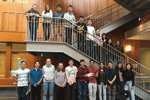 Applications are now open for summer 2020 QB3-Berkeley Undergraduate Biotech Internships, a program that offers students full-time, paid research experience at Bay Area biotech companies. Interns have previously worked at companies and organizations that include CZ Biohub, Carmot Therapeutics, Plexxikon, and more. The program is open Berkeley sophomores and juniors with minimum 3.2 GPA and previous lab experience. Applications are due online by January 31st 2020. More >
Applications are now open for summer 2020 QB3-Berkeley Undergraduate Biotech Internships, a program that offers students full-time, paid research experience at Bay Area biotech companies. Interns have previously worked at companies and organizations that include CZ Biohub, Carmot Therapeutics, Plexxikon, and more. The program is open Berkeley sophomores and juniors with minimum 3.2 GPA and previous lab experience. Applications are due online by January 31st 2020. More >
Katie Krolikowski serves as latest Professional in Residence  On November 22nd, Katie Krolikowski, visited QB3-Berkeley as a Professional in Residence (PIR). Krolikowski is a Berkeley Berkeley postdoctoral fellow and Contra Costa College professor who shared her experiences teaching in California’s community college system and offered students and postdocs advice for landing teaching-focused faculty positions. PIR is a new program from QB3-Berkeley’s Graduate and Postdoc Career Development office that brings accomplished scientists to campus to highlight the diverse career paths and opportunities available to graduate students and postdocs. Learn more about QB3-Berkeley’s Graduate and Postdoc Career Development office’s upcoming programs.
On November 22nd, Katie Krolikowski, visited QB3-Berkeley as a Professional in Residence (PIR). Krolikowski is a Berkeley Berkeley postdoctoral fellow and Contra Costa College professor who shared her experiences teaching in California’s community college system and offered students and postdocs advice for landing teaching-focused faculty positions. PIR is a new program from QB3-Berkeley’s Graduate and Postdoc Career Development office that brings accomplished scientists to campus to highlight the diverse career paths and opportunities available to graduate students and postdocs. Learn more about QB3-Berkeley’s Graduate and Postdoc Career Development office’s upcoming programs.
Lenny Teytelman visits campus as Professional in Residence  On November 15th, Lenny Teytelman visited QB3-Berkeley as a Professional in Residence (PIR). Teytelman, a cofounder of Protocols.io and a Berkeley alumnus, shared his experiences going from a doctoral student to running a startup and offered students and postdocs ideas for utilizing their scientific skill set in the private sector. PIR is a new program from QB3-Berkeley’s Graduate and Postdoc Career Development office that brings accomplished scientists to campus to highlight the diverse career paths and opportunities available to graduate students and postdocs. Sign up for the next PIR, Contra Costa College Professor Katie Krolikowski, on QB3-Berkeley’s Graduate and Postdoc Career Development office’s website. More >
On November 15th, Lenny Teytelman visited QB3-Berkeley as a Professional in Residence (PIR). Teytelman, a cofounder of Protocols.io and a Berkeley alumnus, shared his experiences going from a doctoral student to running a startup and offered students and postdocs ideas for utilizing their scientific skill set in the private sector. PIR is a new program from QB3-Berkeley’s Graduate and Postdoc Career Development office that brings accomplished scientists to campus to highlight the diverse career paths and opportunities available to graduate students and postdocs. Sign up for the next PIR, Contra Costa College Professor Katie Krolikowski, on QB3-Berkeley’s Graduate and Postdoc Career Development office’s website. More >
New career program helps bioscience grad students and postdocs find their fit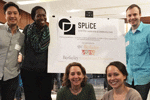 The QB3-Berkeley Graduate and Postdoc Career Development office is highlighted online and in the fall newsletter from the Department of Molecular and Cell Biology (MCB). The office, launched in 2018, offers scientists-in-training opportunities to explore diverse career paths and develop career planning and job search skills through workshops and events. Director Rosanne Lurie says, “I believe individuals benefit if they have a better, clearer understanding of their career options and pursue things that match their real strengths and their motives.” Read more about the QB3-Berkeley Graduate and Postdoc Career Development office on the MCB website. More >
The QB3-Berkeley Graduate and Postdoc Career Development office is highlighted online and in the fall newsletter from the Department of Molecular and Cell Biology (MCB). The office, launched in 2018, offers scientists-in-training opportunities to explore diverse career paths and develop career planning and job search skills through workshops and events. Director Rosanne Lurie says, “I believe individuals benefit if they have a better, clearer understanding of their career options and pursue things that match their real strengths and their motives.” Read more about the QB3-Berkeley Graduate and Postdoc Career Development office on the MCB website. More >
New frontiers in gene editing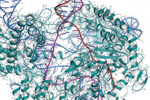 The fall issue of Berkeley Engineer features professors Irina Conboy and Niren Murthy and their research employing CRISPR-Cas9 in the fight against genetic disorders. “Genetic diseases are one of the few types of diseases where we exactly know the mechanism,” says Murthy. “That means if you had a way of correcting that sequence you have a very high chance of actually curing that disease.” Read more about Conboy and Murthy’s work in the fall issue of the magazine. More >
The fall issue of Berkeley Engineer features professors Irina Conboy and Niren Murthy and their research employing CRISPR-Cas9 in the fight against genetic disorders. “Genetic diseases are one of the few types of diseases where we exactly know the mechanism,” says Murthy. “That means if you had a way of correcting that sequence you have a very high chance of actually curing that disease.” Read more about Conboy and Murthy’s work in the fall issue of the magazine. More >
Weill Neurohub will fuel race to find new treatments for brain disease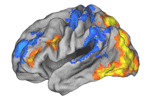 With a $106 million gift from the Weill Family Foundation, UC Berkeley UC San Francisco and the University of Washington have launched the Weill Neurohub, an innovative research network that will forge and nurture new collaborations between neuroscientists and researchers working in an array of other disciplines—including engineering, computer science, physics, chemistry, and mathematics—to speed the development of new therapies for diseases and disorders that affect the brain and nervous system. QB3 faculty affiliate Ehud Isacoff will serve as co-director of the new Weill Neurohub. More >
With a $106 million gift from the Weill Family Foundation, UC Berkeley UC San Francisco and the University of Washington have launched the Weill Neurohub, an innovative research network that will forge and nurture new collaborations between neuroscientists and researchers working in an array of other disciplines—including engineering, computer science, physics, chemistry, and mathematics—to speed the development of new therapies for diseases and disorders that affect the brain and nervous system. QB3 faculty affiliate Ehud Isacoff will serve as co-director of the new Weill Neurohub. More >
College of Chemistry to build new Heathcock Hall with gift of $25 million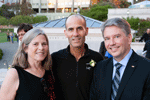 UC Berkeley alumnus Terry Rosen, the CEO of Arcus Biosciences, and his wife, Tori, have donated $25 million to the College of Chemistry for a building to be named in honor of Terry Rosen’s beloved mentor and QB3 faculty affiliate, Clayton Heathcock. Rosen, who obtained his PhD in 1985 while working in Heathcock’s lab, has fond memories of the four years he spent at UC Berkeley and decided that naming a building after Heathcock was a great way to say, ‘Thank you.’ Read more about this historic gift on Berkeley News. More >
UC Berkeley alumnus Terry Rosen, the CEO of Arcus Biosciences, and his wife, Tori, have donated $25 million to the College of Chemistry for a building to be named in honor of Terry Rosen’s beloved mentor and QB3 faculty affiliate, Clayton Heathcock. Rosen, who obtained his PhD in 1985 while working in Heathcock’s lab, has fond memories of the four years he spent at UC Berkeley and decided that naming a building after Heathcock was a great way to say, ‘Thank you.’ Read more about this historic gift on Berkeley News. More >
Berkeley Talks: Nobel Laureate Randy Schekman on New Parkinson’s Research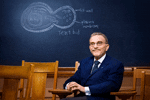 Randy Schekman spoke at this year’s Aging, Research and Technology Innovation Summit, a daylong event that brought together researchers, entrepreneurs, policymakers and health care workers to tackle some of the biggest questions in aging research. This year’s summit focused on the challenge of understanding and treating neurodegenerative diseases. Schekman, a professor of molecular and cell biology at UC Berkeley, won the 2013 Nobel Prize in physiology or medicine. He spoke at the summit about Parkinson’s disease, touching on what we already know about the disease and new research efforts that are underway. More >
Randy Schekman spoke at this year’s Aging, Research and Technology Innovation Summit, a daylong event that brought together researchers, entrepreneurs, policymakers and health care workers to tackle some of the biggest questions in aging research. This year’s summit focused on the challenge of understanding and treating neurodegenerative diseases. Schekman, a professor of molecular and cell biology at UC Berkeley, won the 2013 Nobel Prize in physiology or medicine. He spoke at the summit about Parkinson’s disease, touching on what we already know about the disease and new research efforts that are underway. More >
New study offers clues to how early humans evaded immunodeficiency viruses For hundreds of thousands of years, monkeys and apes have been plagued by simian immunodeficiency virus (SIV), which still devastates primate groups in Africa. James Hurley and his research team have now discovered how a long-ago human mutation interfered with SIV infection, a finding that could provide clues for the development of new therapies to thwart HIV and similar viral infections. More >
For hundreds of thousands of years, monkeys and apes have been plagued by simian immunodeficiency virus (SIV), which still devastates primate groups in Africa. James Hurley and his research team have now discovered how a long-ago human mutation interfered with SIV infection, a finding that could provide clues for the development of new therapies to thwart HIV and similar viral infections. More >
Doudna awarded prize for helping build a better, more harmonious world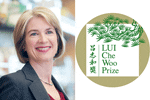 Structural biologist and biochemist Jennifer Doudna has been honored with the 2019 Welfare Betterment Prize, a relatively new Hong Kong-based prize, for her pioneering discovery of CRISPR-Cas9 gene editing. Founded in 2015 by Dr. Lui Che-woo, the international award is given for advancing world civilization and inspiring people to build a more harmonious world. More >
Structural biologist and biochemist Jennifer Doudna has been honored with the 2019 Welfare Betterment Prize, a relatively new Hong Kong-based prize, for her pioneering discovery of CRISPR-Cas9 gene editing. Founded in 2015 by Dr. Lui Che-woo, the international award is given for advancing world civilization and inspiring people to build a more harmonious world. More >
Arash Komeili Named Bakar Fellow Professor Arash Komeili has joined the ranks of the Bakar Fellows, a program that provides five years of funding for faculty whose STEM innovations can become commercial products that stimulate California’s economy. Komeili’s lab uses a combination of cell biological, genetic, and biochemical approaches to understand the genesis and function of magnetosomes, miniature iron-based magnets synthesized by some bacteria for use as a compass. As a Bakar Fellow, Komeili will use these bacteria to engineer microorganisms capable of biomining important metals. More >
Professor Arash Komeili has joined the ranks of the Bakar Fellows, a program that provides five years of funding for faculty whose STEM innovations can become commercial products that stimulate California’s economy. Komeili’s lab uses a combination of cell biological, genetic, and biochemical approaches to understand the genesis and function of magnetosomes, miniature iron-based magnets synthesized by some bacteria for use as a compass. As a Bakar Fellow, Komeili will use these bacteria to engineer microorganisms capable of biomining important metals. More >
Wenjun Zhang Receives Presidential Early Career Award Wenjun Zhang has been awarded the Presidential Early Career Award for Scientists and Engineers, the highest honor bestowed by the U.S. government on scientists and engineers in the early stages of their careers. Zhang, an associate professor of chemical and biomolecular engineering and the Charles Wilke Professor in Chemical Engineering, explores the microbial synthesis of molecules of importance to public health and bioenergy. More >
Wenjun Zhang has been awarded the Presidential Early Career Award for Scientists and Engineers, the highest honor bestowed by the U.S. government on scientists and engineers in the early stages of their careers. Zhang, an associate professor of chemical and biomolecular engineering and the Charles Wilke Professor in Chemical Engineering, explores the microbial synthesis of molecules of importance to public health and bioenergy. More >

June 19, 2019 – Scientists Chart Course Toward a New World of Synthetic Biology
Genetically engineered trees that provide fire-resistant lumber for homes. Modified organs that won’t be rejected. Synthetic microbes that monitor your gut to detect invading disease organisms and kill them before you get sick. These are just some of the exciting advances likely to emerge from the 20-year-old field of engineering biology, or synthetic biology, which is now mature enough to provide solutions to a range of societal problems, according to a new roadmap released by the Engineering Biology Research Consortium, a public-private partnership partially funded by the National Science Foundation and centered at the University of California, Berkeley. More >
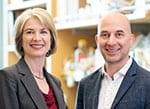
June 13, 2019 – GlaxoSmithKline Taps UC’s CRISPR Expertise to Speed Drug Discovery
The pharmaceutical company GlaxoSmithKline (GSK) announced a five-year collaboration with UC Berkeley and UCSF to establish a laboratory where state-of-the-art CRISPR techniques will be used to explore how gene mutations cause disease, potentially yielding new technologies using CRISPR that would rapidly accelerate the discovery of new medicines. The new Laboratory for Genomics Research (LGR) is the brainchild of Jennifer Doudna, a co-inventor of CRISPR technology; Jonathan Weissman, a UCSF pioneer of CRISPR screening technology; and Hal Barron, Chief Scientific Officer and President for R&D at GSK. More >
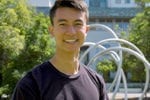
May 10, 2019 – Congrats to Tyler Chen, University Medalist
Streets lab member Tyler Chen is this year’s winner of the University Medal, Berkeley’s highest honor for a graduating senior. A joint major in bioengineering and materials science, Chen heads next to a Stanford Ph.D. program. Beyond impressive academics, he also has a third-degree black belt in taekwondo and trains in “tricking,” a high-octane combo of martial arts and parkour. More >

April 2, 2019 – Zooming in on an Inner-Cell DNA Repair Shop
Inside every cell of the human body are molecular machines that help package, read, and repair DNA. These protein assemblies are essential to survival, yet we know little about how they function because, until recently, it was impossible to accurately describe their structure. Too small to see with a light microscope and too intricate and scarce to image using traditional X-ray-based methods, molecules of this nature are finally being mapped out at the atomic level thanks to next-generation cryo-electron microscopy (cryo-EM) employed by Eva Nogales and her colleagues. More >
April 1, 2019 – Breakthrough Study of Cell Signaling Holds Promise for Immune Research and Beyond
Due to the wide implications for human health, scientists have long tried in order to unravel how T cells achieve a balance in reacting to environmental signals responding when necessary and tuning out fake signals. For the first time ever, Jay Groves and his colleagues have imaged the process by which an individual immune system molecule is switched on in response to a signal from the environment, leading to the critical discovery that the activation process involves hundreds of proteins suddenly coming together to form a linked network through a process known as a phase transition. More >
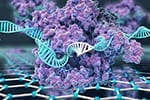
March 25, 2019 – New CRISPR-powered Device Detects Genetic Mutations in Minutes
Kiana Aran, Niren Murthy, Irena Conboy, and their colleagues at UC Berkeley and the Keck Graduate Institute (KGI) of The Claremont Colleges combined CRISPR with electronic transistors made from graphene to create a new hand-held device that can detect specific genetic mutations in a matter of minutes. The device, dubbed CRISPR-Chip, could be used to rapidly diagnose genetic diseases or to evaluate the accuracy of gene-editing techniques. The team used the device to identify genetic mutations in DNA samples from Duchenne muscular dystrophy patients. More >

March 15, 2019 – With Single Gene Insertion, Blind Mice Regain Sight
It was surprisingly simple. Ehud Isacoff and his colleagues inserted a gene for a green-light receptor into the eyes of blind mice and, a month later, they were navigating around obstacles as easily as mice with no vision problems. They were able to see motion, brightness changes over a thousandfold range and fine detail on an iPad sufficient to distinguish letters. The researchers say that, within as little as three years, the gene therapy — delivered via an inactivated virus — could be tried in humans who’ve lost sight because of retinal degeneration, ideally giving them enough vision to move around and potentially restoring their ability to read or watch video. More >
February 27, 2019 – Yeast Produce Low-cost, High-quality Cannabinoids
Jay Keasling and his colleagues have engineered brewer’s yeast to produce marijuana’s main ingredients—mind-altering THC and non-psychoactive CBD—as well as novel cannabinoids not found in the plant itself. Feeding only on sugar, the yeast are an easy and cheap way to produce pure cannabinoids that today are costly to extract from the buds of the marijuana plant, Cannabis sativa. In addition, according to Keasling, “It is a safer, more environmentally friendly way to produce cannabinoids.” More >
February 25, 2019 – With Nanotubes, Genetic Engineering in Plants is Easy-peasy
Genetic engineering of plants is at the core of sustainability efforts, natural product synthesis, and crop engineering. The plant cell wall is a barrier that limits the ease of biomolecule delivery to plants. Current methods either suffer from host-range limitations, low efficiencies, or unavoidable DNA integration into the host genome. Markita Landry and her colleagues have that nanomaterials can not only facilitate biomolecule transport into plant cells but also protect polynucleotides from nuclease degradation. Their work provides a tool for species-independent and passive delivery of genetic material into plant cells for diverse biotechnology applications. More >
January 10, 2019 – Giving Cas9 an ‘On’ Switch for Better Control of CRISPR Gene Editing
CRISPR-Cas9 is a revolutionary tool in part because of its versatility: created by bacteria to chew up viruses, it works equally well in human cells to do all sorts of genetic tricks, including cutting and pasting DNA, making pinpoint mutations and activating or inactivating a gene. David Savage, Jennifer Doudna, Adam Arkin, and their colleagues have now made it even more versatile by giving it an “on” switch, allowing users to keep the Cas9 gene editor turned off in all cells except its designated target. More >
Faculty Awards News
December 20, 2019 – Isacoff receives McKnight Award
Professor of Neurobiology and QB3-Berkeley faculty affiliate Ehud Isacoff has received the 2020–22 Memory & Cognitive Disorders Award from the McKnight Foundation. Isacoff shares the award with his collaborator, New York University Professor of Neuroscience Dirk Trauner for their work on photo-activation of dopamine receptors in models of Parkinson’s Disease. This award recognizes research aimed at translating laboratory discoveries about the brain and nervous system into diagnoses and therapies to improve human health. Read more about the McKnight Foundation Award here.

November 26, 2019 – Schaffer elected fellow of the AAAS
Five Berkeley faculty members, including QB3-Berkeley faculty affiliate David Schaffer, have been named fellows of the American Association for the Advancement of Science (AAAS), an honor bestowed upon the society’s members by their peers. Schaffer, a professor of chemical and biomolecular engineering and of bioengineering, was recognized “for pioneering contributions to biomolecular engineering, with particular attention to directed evolution to create viruses for the efficient, targeted and safe delivery of gene medicines.” Read more on Berkeley News. >

October 21, 2019 – Alivisatos Honored with Welch Award
Paul Alivisatos has been awarded this year’s Welch Award in Chemistry from the Houston-based Welch Foundation. Alivisatos was selected for the award for his work with the fabrication of nanocrystals and their use in renewable energy and biomedical applications. He shares the award with Harvard University’s Charles M. Lieber. More >

September 30, 2019 – Amy Herr Receives Excellence in Postdoctoral Mentoring Award
Professor Amy Herr has received the 2019 Faculty Award for Excellence in Postdoctoral Mentoring at UC Berkeley, from the Visiting Scholar and Postdoc Affairs Program. She was selected from an esteemed group of UC Berkeley faculty by a committee of the Berkeley Postdoctoral Association. More >

September 25, 2019 – Four QB3-Berkeley Engineers Named Siebel Scholars
Four graduate students in QB3-Berkeley affiliate labs have been named to the Siebel Scholars Foundation’s 2020 class. The Siebel Scholars program annually recognizes top students at the world’s leading graduate schools of bioengineering, business, computer science and energy science. Congratulations to Roberto Falcon-Banchs (Sohn lab), Christina Fuentes (Schaffer lab), Ari Joffe (Fletcher lab) and Kayla Wolf (Kumar lab). More >

August 27, 2019 – Eva Nogales Named a 2020 Biophysical Society Fellow
Professor Eva Nogales has been recognized by the Biophysical Society for her demonstrated excellence in science and contributions to the success and vitality of the biophysics field. The Biophysical Society is an international scientific society created to promote the development and dissemination of biophysics knowledge through meetings, publications, community outreach, and career placement. More >

August 26, 2019 – Markita Landry recognized as chemical sciences rising star
Assistant professor Markita Landry is among this year’s class of “talented 12” young stars in the chemical sciences who are working to solve some of the world’s most challenging problems. The list is created by the American Chemical Society and featured during its annual meeting and exposition. Landry was selected for her work as a “nanomaterials whiz [who] is developing tools to deliver DNA to plants and detect brain chemicals.” More >

July 8, 2019 – Wenjun Zhang Receives Presidential Early Career Award
Wenjun Zhang has been awarded the Presidential Early Career Award for Scientists and Engineers, the highest honor bestowed by the U.S. government on scientists and engineers in the early stages of their careers. Zhang, an associate professor of chemical and biomolecular engineering and the Charles Wilke Professor in Chemical Engineering, explores the microbial synthesis of molecules of importance to public health and bioenergy. More >

June 14, 2019 – Streets Named Pew Scholar in Biomedical Sciences
Aaron Streets is one of 22 early-career researchers joining the 2019 Pew Scholars Program in Biomedical Sciences. The honor comes with four years of funding for exploratory research to advance human health. Streets will explore how obesity leads to unhealthy changes in the cellular, molecular, and structural composition of adipose tissue. More >

June 11, 2019 – Nogales Elected EMBO Associate Member
The European Molecular Biology Organization (EMBO) elected Eva Nogales as an Associate Member. With membership of more than 1,800 leading researchers, EMBO supports talented researchers at all stages of their careers, stimulates exchange of information, and builds a high-achievement research environment. New members will be formally welcomed at a annual meeting this fall in Heidelberg. More >

May 24, 2019 – Record Number of QB3 Summer Interns
Congratulations to the 25 Berkeley students placed in QB3 summer internships with Bay Area biotech companies — a record number of placements for QB3’s selective program. More >

April 18, 2019 – Staskawicz Elected Royal Society Fellow
The Royal Society of London, the oldest scientific academy in continuous existence, announced the election of Brian Staskawicz as a new fellow. Staskawicz, a professor of plant and microbial biology and a codirector of the Innovative Genomics Institute, studies plants’ innate immunity with the goal of engineering disease resistance in agricultural crops. More >
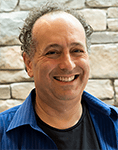
March 5, 2019 – Eisen Picked as eLife Editor-in-Chief
Michael Eisen has been selected to be Editor-in-Chief of eLife, a peer-reviewed open access scientific journal for the biomedical and life sciences. A leader in advocacy for open science, Eisen has worked to reform research communication for the benefit of scientists and society. More >

March 5, 2019 – Streets Receives NSF CAREER Award
Aaron Streets has been awarded a 2019 NSF CAREER Award for his research on a microfluidic-microscopy hybrid platform for whole-tissue chemical and transcriptional profiling. The Faculty Early Career Development (CAREER) Program offers the National Science Foundation’s most prestigious awards in support of junior faculty who exemplify the role of teacher-scholars through outstanding research, excellent education and the integration of education and research within the context of the mission of their organizations. More >
February 20, 2019 – Priya Moorjani Wins Sloan Research Fellowship
Priya Moorjani, an assistant professor of molecular and cell biology, is among seven UC Berkeley assistant professors to receive a Sloan Research Fellowship, recognizing their early career achievements. Moorjani’s research focuses on questions in human population genetics and evolutionary biology with a central aim of understanding evolutionary history and its impact on human adaptation and disease. More >

February 14, 2019 – Nogales Receives Grimwade Medal
Eva Nogales is the 2019 recipient of the Grimwade Medal, awarded by the University of Melbourne to an outstanding researcher in biochemistry and molecular biology. The award is also accompanied by a prize of AU$5,000.
Nogales presented on her research in the field of cryoelectron microscopy at the annual Lorne ‘Proteins’ Conference in Lorne, Australia, in February 2019. More >
January 18, 2019 – Graduate and Postdoc Career Development Expanding
The QB3-Berkeley Graduate and Postdoc Career Development Office is expanding its support. The office was launched in early fall 2018 to strengthen professional development support for graduate students and postdoctoral researchers in the biological sciences at Berkeley. Expanding resources include more than 13 events in spring 2019, and online overviews of more than 10 career fields; follow on twitter for the latest news @QB3Berkeley. More >


